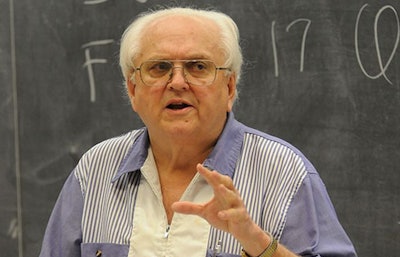
As an alumnus, I may be a little biased, but few universities can claim more agricultural rock stars than Kansas State University (K-State).
And when it comes to rock star status in the field of agricultural policy, Barry Flinchbaugh was Elvis Presley, Paul McCartney and Mick Jagger, combined.
Flinchbaugh, emeritus professor of agricultural economics at K-State who had been affiliated with the university since 1971, died on November 2. He was 78.
Social media has been buzzing about Flinchbaugh and his impact on K-State students and the wider agricultural community, and how badly he will be missed. “Legacy” was a commonly used word.
“The legacy of leadership that Dr. Flinchbaugh demonstrated was legendary,” one friend posted.
“No words can do Dr. Flinchbaugh’s life and legacy justice,” wrote another.”
“He was a one-of-a kind man who made me a better person,” another stated.
There are certainly more sentiments of that nature out there, considering he taught more than 4,000 undergraduate students during his tenure at K-State.
Well-known as one of the country’s leading experts on agricultural economics and policy, he became very high in demand for his expertise. According to a press release from K-State Research and Extension, he would receive as many as 100 speaking invitations per year. He was also quoted in scores of news articles and press releases I have read and often published over the years.
But he was also in high demand from policymakers themselves. For more than four decades, Flinchbaugh was a top adviser to officials from both major political parties, including U.S. Secretaries of Agriculture, agriculture committee leaders and governors. He was also involved to some degree in every U.S. farm bill written since 1968.
I believe the last time I saw Flinchbaugh in person was back in 2013, when negotiations were going on for the farm bill passed during President Barack Obama’s second term. He moderated a farm bill panel discussion that included former agriculture secretaries John Block, Mike Espy, Dan Glickman, Ann Veneman, Mike Johanns and Ed Schafer – people he undoubtedly had a lot of pull in order to assemble such an impressive group. Needless to say, it was a great discussion and I learned a lot.
It makes me sad to know that as I write this, it is election day. We are choosing who our next president will be, which will also impact who our next agriculture secretary will be. We will also select the U.S. House members who will play a role in drafting upcoming agriculture legislation in 2021 and 2022, as well as many of the senators who will be involved.
Even without knowing who will be elected, we know two of the key negotiators of the last farm bill –Senate Agriculture Committee Chairman Pat Roberts and then-House Agriculture Committee Chairman Mike Conaway – are retiring and will not be at the table.
And sadly, neither will Flinchbaugh. But I’m pretty sure his legacy will.

















